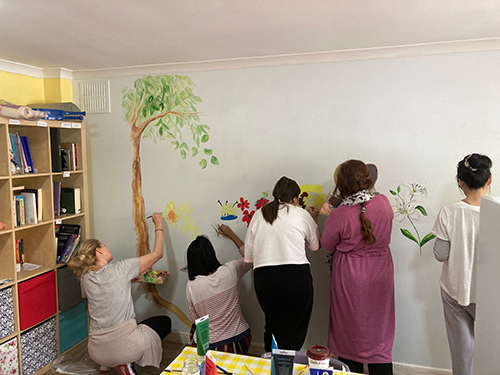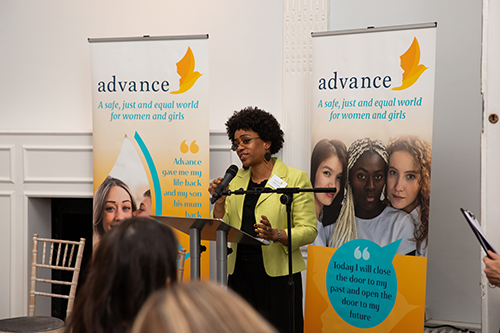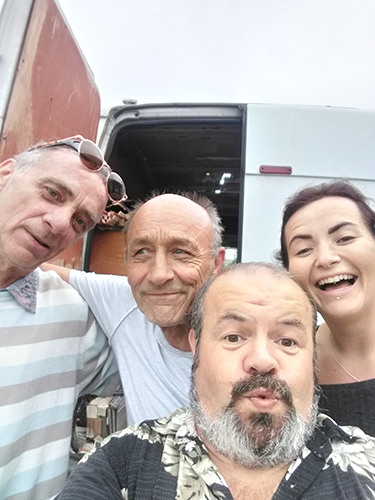Social Care, Advice and Support 2025 winners: Street Talk
Why it won
- Innovation: The charity’s unique therapy model supports women who are often excluded from other services.
- Outcomes: The charity reports impressive data on the number of women it’s helped who have gone into education or employment, found a home, settled their immigration status and achieved other positive outcomes.
- Replicability: The Street Talk model of therapy is already being used by at least 17 other services.
Street Talk has developed a model of therapy for women who wind up on the street through sex work or trafficking, in order to help them overcome a lifetime of abuse, abandonment and complex trauma.
 Over the course of one year about 150 women engage with Street Talk across several areas of London, at a cost of around £1,000 per woman, per year.
Over the course of one year about 150 women engage with Street Talk across several areas of London, at a cost of around £1,000 per woman, per year.
Most of the women are excluded from other mental health services as a result of issues such as homelessness, dual diagnosis, missed appointments or other chaotic behaviour. Street Talk is often the only service left open to them.
Its outreach model takes intensive psychotherapy into hostels or day centres where women live or feel comfortable, and it continually incorporates the feedback and guidance that it receives from the women into the delivery of the service.
Three out of seven trustees are former service users with lived experience of being in prison, in an immigration detention centre, of street prostitution and of being put under section.
Street Talk also works to ensure that women’s mental health is taken into consideration in court and by other agencies and professionals who make the decisions that affect these women’s lives. The charity shares an understanding of the impact of trauma in order that other agencies support women’s recovery. The outcome is that fewer women are sent to prison, fewer children are taken into the state care system and more women who would be in grave danger in their country of origin gain asylum in this country.
Street Talk’s founder, Pippa Hockton, deliberately wants to keep the charity small so that she can continue to ensure the service quality and to practice therapy herself. However, she has published a book describing the therapeutic model and she makes this freely available to other organisations – including those that work with vulnerable men – who can replicate it within their own services.
To date, the charity knows of 17 counselling services which have been set up on the Street Talk therapy model, including by St Mungo’s Safer Bed Space, the Human Trafficking Foundation and Spitalfields Trust.
Awards judge Cathy Phelan, chair and owner of Civil Society Media, described Street Talk’s programme as “genuinely innovative” and absolutely replicable.
Farah Nazeer, CEO of Women’s Aid, said it was “transformative and really important work”. “They work on the margins of human rights, human trafficking, domestic abuse – and no one else really wants to do that intersection, because it’s so hard and so poorly funded.”
CC Reg. no. 1117588
Highly Commended
Advance Advocacy and Non Violence Community Education
The Angelou Partnership is a collaboration of 10 specialist organisations, led by Advance Advocacy and Non Violence Community Education, to deliver holistic violence against women and girls services in three London boroughs. The partnership is designed to become a single “front door” for survivors, making services more accessible by guiding victims/survivors to the services they need. Following a review in 2015, the charities worked together to coordinate their provision and to develop much greater knowledge and understanding of issues such as honour-based abuse, sexual violence, substance abuse, mental health problems, and the impact of no recourse to public funds. Throughout the lifetime of the partnership, 97% of women have reported feeling safer after support.
Turning Tides Homelessness
Sussex-based homelessness charity Turning Tides has adopted a Housing First programme model, which provides people with a stable home first, alongside person-centred, holistic support with no specified end point. The Housing First team works in partnership with registered social landlords and local authorities in Worthing, Horsham, Mid-Sussex and Crawley. Once an individual has accommodation, key workers help to ensure they receive the other types of support they need. The Housing First project has worked with 37 people since it began, of whom 22 are now in permanent accommodation and supported.



